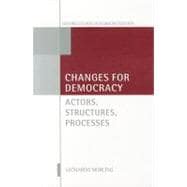
Note: Supplemental materials are not guaranteed with Rental or Used book purchases.
Purchase Benefits
What is included with this book?
| List of Figures | p. ix |
| List of Tables | p. x |
| Introduction | p. 1 |
| The Basics | |
| What Theory in Democratization Studies? | p. 7 |
| Theories of institutional change | p. 7 |
| A Retreat from theory? | p. 11 |
| What are the possible theoretical developments? | p. 18 |
| Definitional Conundrums | p. 25 |
| Core definitions | p. 26 |
| Minimalist empirical definition | p. 31 |
| Main normative definitions | p. 34 |
| Are There Hybrid Regimes? | p. 48 |
| A widespread phenomenon? | p. 49 |
| Definition and analytic dimensions | p. 50 |
| Empirical cases of hybrid regimes, or sheer fantasy? | p. 57 |
| What kind of classification? | p. 60 |
| Where to go from here? | p. 67 |
| Transitions, Consolidations, Crises | |
| What Transitions to Democracy? | p. 77 |
| When is there a regime change? | p. 77 |
| The 'first' transitions and installations | p. 79 |
| Subsequent transitions | p. 83 |
| Installation of democracy: dimensions of variation | p. 85 |
| Installation of democracy: explanatory factors | p. 91 |
| An addendum on parties | p. 97 |
| What is the core mechanism of change? | p. 106 |
| Domestic Anchoring | p. 109 |
| Do consolidation and crisis exist? | p. 109 |
| Legitimation and anchoring | p. 112 |
| The main patterns: Southern Europe | p. 119 |
| Contextual explanations and theoretical foundations | p. 128 |
| How much 'travel' can be done? | p. 132 |
| External Anchoring | p. 144 |
| Methods of influence: what to consider? | p. 144 |
| Layers of impact and cycles of change: the framework | p. 150 |
| Testing the framework empirically | p. 160 |
| Key final remarks | p. 179 |
| Qualities Deepening | |
| Analysing Democratic Qualities | p. 191 |
| The question | p. 191 |
| What is 'quality'? | p. 194 |
| 'Good' democracy and other normative notions | p. 195 |
| What qualities? | p. 196 |
| The procedures | p. 197 |
| The two substantive dimensions | p. 205 |
| The outcome | p. 208 |
| Recurrent patterns of subversion | p. 211 |
| What to focus on? | p. 215 |
| Appendix | p. 216 |
| TODEM Applied | p. 223 |
| Accountabilities and connections | p. 223 |
| From procedures to results and contents | p. 240 |
| Where are the qualities? | p. 249 |
| Appendix | p. 258 |
| Concluding Remarks | p. 264 |
| Bibliography | p. 269 |
| Index | p. 293 |
| Table of Contents provided by Ingram. All Rights Reserved. |
The New copy of this book will include any supplemental materials advertised. Please check the title of the book to determine if it should include any access cards, study guides, lab manuals, CDs, etc.
The Used, Rental and eBook copies of this book are not guaranteed to include any supplemental materials. Typically, only the book itself is included. This is true even if the title states it includes any access cards, study guides, lab manuals, CDs, etc.